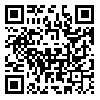Tue, Feb 17, 2026
| فارسی
Volume 29, Issue 1 (Spring 2023)
IJPCP 2023, 29(1): 94-117 |
Back to browse issues page
Download citation:
BibTeX | RIS | EndNote | Medlars | ProCite | Reference Manager | RefWorks
Send citation to:



BibTeX | RIS | EndNote | Medlars | ProCite | Reference Manager | RefWorks
Send citation to:
Khan A, Nasreen R. Investigating the Relationship Between Perceived Impact of Terrorist Attacks, Resilience, and Religious Beliefs on Death Anxiety in Students in Islamabad. IJPCP 2023; 29 (1) :94-117
URL: http://ijpcp.iums.ac.ir/article-1-3581-en.html
URL: http://ijpcp.iums.ac.ir/article-1-3581-en.html
1- Department of Psychology, University of Wah, Rawalpindi, Pakistan. , ayeshainam946@gmail.com
2- Islamabad model college for girls, i-8/3, Islamabad, Pakistan.
2- Islamabad model college for girls, i-8/3, Islamabad, Pakistan.
Abstract: (4644 Views)
Objectives The present research aims to explore the perceived impact of terrorist attacks on death anxiety in terms of dread, lack of control, and extent of exposure. In addition, this study is conducted to explore the moderating effect of resilience attributes and religious beliefs.
Methods In this study, the samples include 359 students (directly perceived = 159, and indirectly perceived = 200). The students were in the age range of 15 to 22 years. The samples were collected from Islamabad City and Rawalpindi City, Pakistan. A total of 223 of the participants were male with a mean age of 18.97 years and a standard deviation of 2.48, and the remaining 136 participants were female with a mean age of 18.53 and a standard deviation of 2.68. The data were collected through the perceived impact of terrorist attack scale (Khan & Rafiq, 2016), the death anxiety scale (Templer, 1970), the resilience scale for adults (Friborg, 2003), and the religiosity questionnaire (Rafiq & Shehzadi, 2013). We used the quantitative research method in this study. After the data collection, they were analyzed using the SPSS software, version 23. Meanwhile, descriptive statistics, correlational analysis, and moderation was done.
Results The results of the correlational analysis indicated that the perceived impact of terrorist attacks (dread, lack of control, and extent of exposure) was significantly and positively (P ≥ 0.001) associated with death anxiety among directly and indirectly perceived individuals; however, directly perceived individuals were less fearful about death when compared to indirectly perceived individuals. Religious beliefs and resilience attributes had moderating effects on the relationship between the perceived impact of terrorist attacks and death anxiety.
Conclusion According to the findings, we can conclude that the belief about the hereafter, the presence of God, and coping may reduce death anxiety more in directly exposed individuals compared to indirectly exposed people.
Methods In this study, the samples include 359 students (directly perceived = 159, and indirectly perceived = 200). The students were in the age range of 15 to 22 years. The samples were collected from Islamabad City and Rawalpindi City, Pakistan. A total of 223 of the participants were male with a mean age of 18.97 years and a standard deviation of 2.48, and the remaining 136 participants were female with a mean age of 18.53 and a standard deviation of 2.68. The data were collected through the perceived impact of terrorist attack scale (Khan & Rafiq, 2016), the death anxiety scale (Templer, 1970), the resilience scale for adults (Friborg, 2003), and the religiosity questionnaire (Rafiq & Shehzadi, 2013). We used the quantitative research method in this study. After the data collection, they were analyzed using the SPSS software, version 23. Meanwhile, descriptive statistics, correlational analysis, and moderation was done.
Results The results of the correlational analysis indicated that the perceived impact of terrorist attacks (dread, lack of control, and extent of exposure) was significantly and positively (P ≥ 0.001) associated with death anxiety among directly and indirectly perceived individuals; however, directly perceived individuals were less fearful about death when compared to indirectly perceived individuals. Religious beliefs and resilience attributes had moderating effects on the relationship between the perceived impact of terrorist attacks and death anxiety.
Conclusion According to the findings, we can conclude that the belief about the hereafter, the presence of God, and coping may reduce death anxiety more in directly exposed individuals compared to indirectly exposed people.
Type of Study: Original Research |
Subject:
Psychiatry and Psychology
Received: 2021/09/22 | Accepted: 2022/08/6 | Published: 2023/04/1
Received: 2021/09/22 | Accepted: 2022/08/6 | Published: 2023/04/1
| Rights and permissions | |
 |
This work is licensed under a Creative Commons Attribution-NonCommercial 4.0 International License. |






